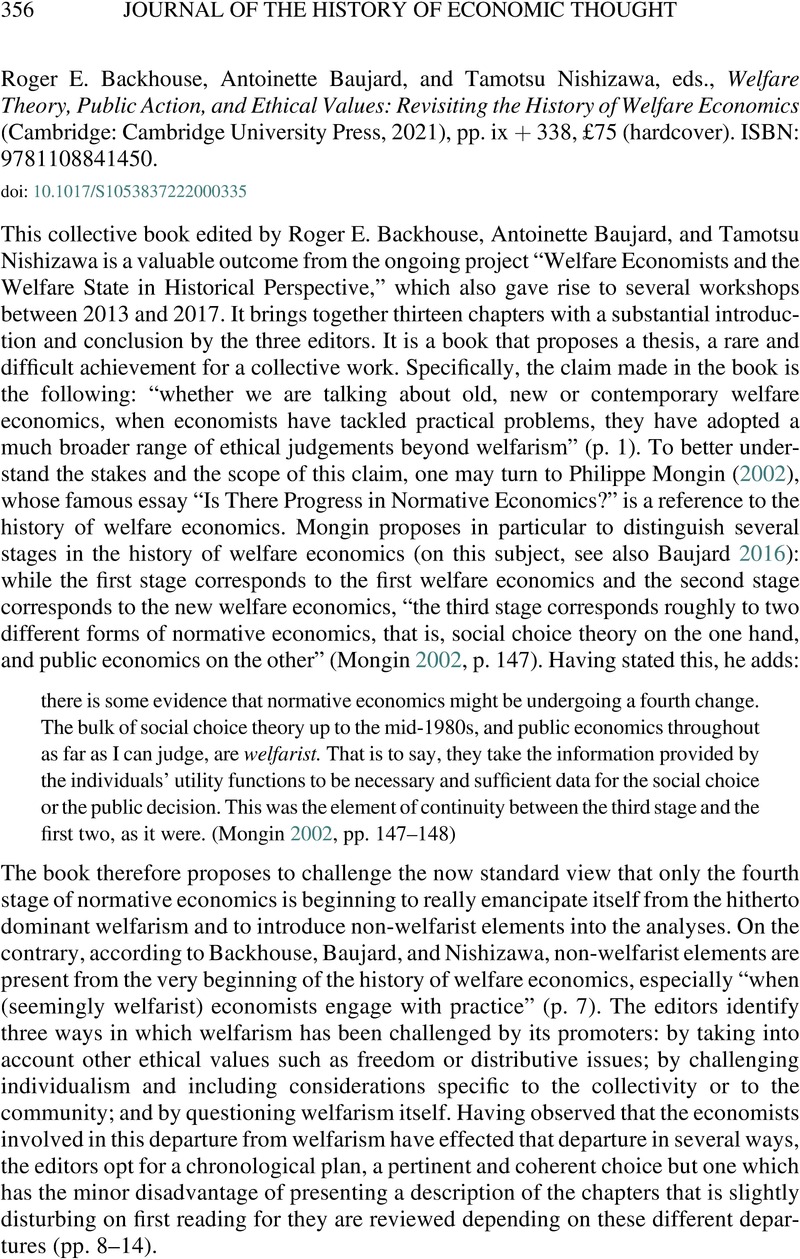No CrossRef data available.
Article contents
Roger E. Backhouse, Antoinette Baujard, and Tamotsu Nishizawa, eds., Welfare Theory, Public Action, and Ethical Values: Revisiting the History of Welfare Economics (Cambridge: Cambridge University Press, 2021), pp. ix + 338, £75 (hardcover). ISBN: 9781108841450.
Review products
Roger E. Backhouse, Antoinette Baujard, and Tamotsu Nishizawa, eds., Welfare Theory, Public Action, and Ethical Values: Revisiting the History of Welfare Economics (Cambridge: Cambridge University Press, 2021), pp. ix + 338, £75 (hardcover). ISBN: 9781108841450.
Published online by Cambridge University Press: 30 January 2023
Abstract
An abstract is not available for this content so a preview has been provided. Please use the Get access link above for information on how to access this content.

- Type
- Book Review
- Information
- Copyright
- © The Author(s), 2023. Published by Cambridge University Press on behalf of the History of Economics Society
References
REFERENCES
Arrow, Kenneth J. [1951] 1963. Social Choice and Individual Values. New Haven and London: Yale University Press.Google Scholar
Backhouse, Roger E. 1985. A History of Modern Economic Analysis. Oxford: Basil Blackwell.Google Scholar
Baujard, Antoinette. 2016. “Welfare Economics.” In Faccarello, G. and Kurz, H., eds., Handbook of the History of Economic Analysis. Volume 3. Cheltenham: Edward Elgar, pp. 611–623.Google Scholar
Bergson, Abram. 1982. “Paul A. Samuelson: The Harvard Days.” In Feiwel, G. R., ed., Samuelson and Neoclassical Economics. Boston: Kluwer, pp. 331–335.CrossRefGoogle Scholar
Fleurbaey, Marc. 2003. “On the Informational Basis of Social Choice.” Social Choice and Welfare 21 (2): 347–384.CrossRefGoogle Scholar
Fleurbaey, Marc, and Mongin, Philippe. 2005. “The News of the Death of Welfare Economics Is Greatly Exaggerated.” Social Choice and Welfare 25 (2): 381–418.CrossRefGoogle Scholar
Hicks, J. R. (1975). The Scope and Status of Welfare Economics. Oxford Economic Papers, 27(3), 307–326.CrossRefGoogle Scholar
Igersheim, Herrade. 2019. “The Death of Welfare Economics: History of a Controversy.” History of Political Economy 51 (5): 827–865.CrossRefGoogle Scholar
Mongin, Philippe. 2002. “Is There Progress in Normative Economics?” In Boehm, S., Gehrke, C., and Kurz, H. D., eds., Is There Progress in Economics? Knowledge, Truth and the History of Economic Thought. Cheltenham: Edward Elgar, pp. 145–170.Google Scholar
Putnam, Hilary. 2002. The Collapse of the Fact/Value Dichotomy and Other Essays. Cambridge: Harvard University Press.Google Scholar
Robbins, Lionel. [1932] 1969. An Essay on the Nature and the Significance of Economic Science. New York: Macmillan.Google Scholar
Samuelson, Paul A. 1981. “Bergsonian Welfare Economics.” In Rosefielde, S., ed., Economic Welfare and the Economics of Soviet Socialism: Essays in Honor of Abram Bergson. Cambridge: Cambridge University Press, pp. 223–266.CrossRefGoogle Scholar
Samuelson, Paul A. 1983. “Economics in a Golden Age: A Personal Memoir.” In Brown, E. C. and Solow, R. M., eds., Paul Samuelson and Modern Economic Theory. New York: McGraw-Hill, pp. 1–14.Google Scholar
Suzumura, Kotaro. 2005. “An Interview with Paul Samuelson: Welfare Economics, ‘Old’ and ‘New,’ and Social Choice Theory.” Social Choice and Welfare 25 (2–3): 327–356.CrossRefGoogle Scholar


